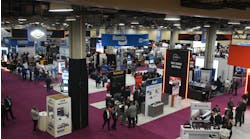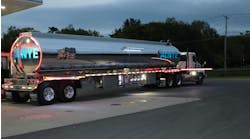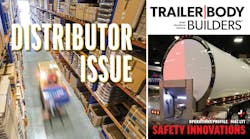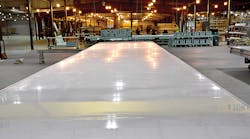MSC update: 'Value proposition' has surged in past six months—and so has interest
In the Wabash National first quarter Q&A with investment analysts, Jeff Kauffman of Vertical Research Partners asked about Wabash’s Molded Structural Composite (MSC) technology, calling it a possible “game changer” and comparing it to the DuraPlate composite panel and its impact on the industry when it went into production at Wabash in 1996.
“We’re now a few years into [MSC] and you've made a large investment in it,” Kaufmann said, addressing Wabash CEO Brent Yeagy. “What's come out better than you thought? What's been a little frustrating about it? And how is your view on the role of MSC changing within the company?”
Yeagy quickly emphasized that MSC has entered into “a very unique point in time” due to a number of factors that have recently increased the adoption potential for the technology “across a wide array of products.” And that means beyond the refrigerated van and truck body applications that the technology has been used for since Wabash began producing the panels and assembling trailers in 2018 at the MSC-dedicated plant in Little Falls, Minn. (The technology, when used in refrigerated trailers, boosts thermal performance by up to 25 percent and reduces weight by up to 20 percent when compared to more conventional materials, according to Wabash.)
“It is being actively researched and prototyped in spaces outside of our current portfolio of transportation related solutions, in an active and very scalable way—that's all in what I would call the ‘early prototype’ phase,” Yeagy said. “The amount of activity that we have around the idea of MSC technology is at a scale that's significantly above how we thought about it 24 months ago.”
Simply, “the value proposition” of MSC is not tied to material costs such as steel and aluminum, the prices of which have soared during the global recovery from the pandemic-driven economic slowdown. So MSC trailers—previously priced at a premium compared to conventionally constructed trailers—now suddenly are more valuable to the customers’ bottom lines as well to their sustainability initiatives, Yeagy explained.
“There's value that is being created that wasn't in existence 24 months ago: Tangible, calculable, meaningful value that goes right into executive’s compensation programs—and that makes it a different sale,” he said. “As a result, the amount of door knocking coming to us, to explain how [MSC] could impact their business has gone up significantly, just in the last six months.
“So that leaves us in a place where—not only from the manufacturing standpoint, but from a total business standpoint—we are now entering into a phase of how do we sell it, how do we engineer it, how do we turn it into a scalable bill of material so that we can produce this at scale? We've entered into that phase as we look forward to the next three to five years.”
This story originally was published in the May 2021 edition of Trailer/Body BUILDERS magazine.











